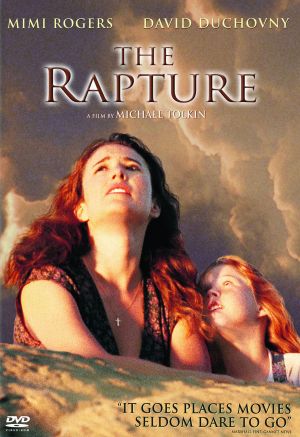
THE RAPTURE
US, 1991, 100 minutes, Colour.
Mimi Rodgers, David Duchovny, Will Patton, Patrick Bauchau, James Le Gros, Dick Anthony Williams.
Directed by Michael Tolkin.
When this film was released in the early 90s, there was not so much world focus on the Rapture and more fundamentalist aspects of Christianity, especially in the United States. However, as the end of the millennium grew nearer, a number of Christian groups began to make apocalyptic features. The most prominent of these was the Left Behind series, based on a number of novels. The film posited a preparation for the end of the world, but also an experience of rapture, when people who were chosen by God suddenly disappeared. The remnant left on Earth had to deal with reform, repentance and dealing with their lives as well as the series of world wars which began to develop in the series. This was the work of false and deceitful prophets. The films relied on very little interpretation of the Book of the Apocalypse as well as Old Testament prophets like Ezekiel.
This film was written and directed by Michael Tolkin who achieved some fame with his screenplay for The Player. The Rapture is a strange and sometimes puzzling piece of film-making, mirroring something of the eccentricities of contemporary American life as well as religion of the fundamentalist kind.
Mimi Rogers gives a striking performance as a telephone operator who lives a recklessly amoral life but who is caught up in a conversion experience and, later, a test of her faith when tragedy strikes her family.
The earlier part of the film makes sense and is a vivid look at aspects of America. The latter part is quite demanding in its presentation of mad, apocalyptic visionary religion and the effect that it has on ordinary people.
Tolkin has not written with a definite standpoint and different audiences will read it in different ways, some for the stances that Mimi Rogers takes, some against. It probably needs a second viewing – but it may not persuade its audience that it should watch it again. A bizarre look at American sects and beliefs.
1. The work of Michael Tolkin? Screenwriter, themes? Directing? The film as a piece of Americana, religious Americana? The apocalypse?
2. The scope of the film, American religion, the fundamentalist and literal interpretations of Scripture? The California settings, the California atmosphere, the city, wealth, the contrast with drab surroundings? The desert? The special effects? The musical score?
3. The title: the meaning of the rapture, ecstatic joy or delight, sexual ecstasy, the feeling of being transported to another sphere, the experience of being spirited away to Heaven before the apocalypse? The use of the meanings here? As applied to Sharon’s early life, her conversion, the final challenge? The nature of religious experience and audience reaction to it? Affirming, critical? The credibility of this kind of religion? The critique through dramatisation?
4. The introduction to Sharon, her drab existence, her job, the phone-answering, the routines? Her relationship with Vic, the car, explicit sexuality, the plans, the parties and the couples? Exchanges and the effect? The decadence of her life? Giving some kind of energy to her work? At work, the couple and religion and vision? Secrets?
5. The people talking at work, her listening in, the focus about the boy, the One? The atmosphere of secrecy? The boss and the initiation? Sharon and her being alone, susceptible? Her dreams, the others’ dreams? Her curiosity? The sexual aspects of her life and despair? Ripe for conversion?
6. The experience of conversion, the phones, the boss, religious services? The boy and the prophecies? The explanation of the rapture? Her friend being caught up?
7. The passing of the years, Sharon changing? Becoming more conventional? At home, the marriage, her former lover? Her daughter, at work, the church? The strength of her beliefs?
8. The disaster, the interview, the shooting? Sharon and her daughter, the funeral? Her bearing the suffering?
9. Sharon and her friends, sustaining her? Heaven and her daddy? The nature of faith, the signs, in the desert? Leaving the house, the experience of death? Waiting in the desert? Sharon and her daughter, love, wanting to die?
10. The desert, the hiker and the contact, food, Sharon and her faith? The patrolman, her talk with him, confession? Concern? The effect of the desert?
11. The shooting, the repercussions for Sharon?
12. Prison, her faith, the explanations?
13. The change, the film becoming visionary, the end of the world, the rapture, the biblical images brought to life? Sharon and her sense of freedom? The patrolman, his death, choosing Heaven? Her daughter? Sharon tested as to whether she had faith or not? The issues of living, free will, Purgatory, Hell?
14. The image of God throughout the film? Creator, loving? Vindictive? The fervour of religious people? Faith and/or piety? The nature of religion, religions? The fact of this kind of faith pervading so much of the United States? The film showing its credibility or not?